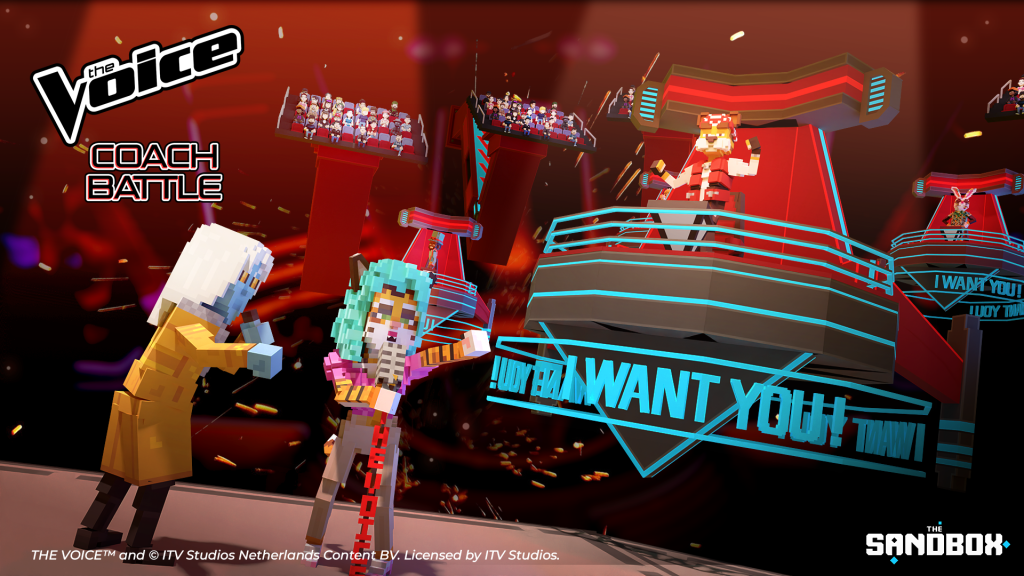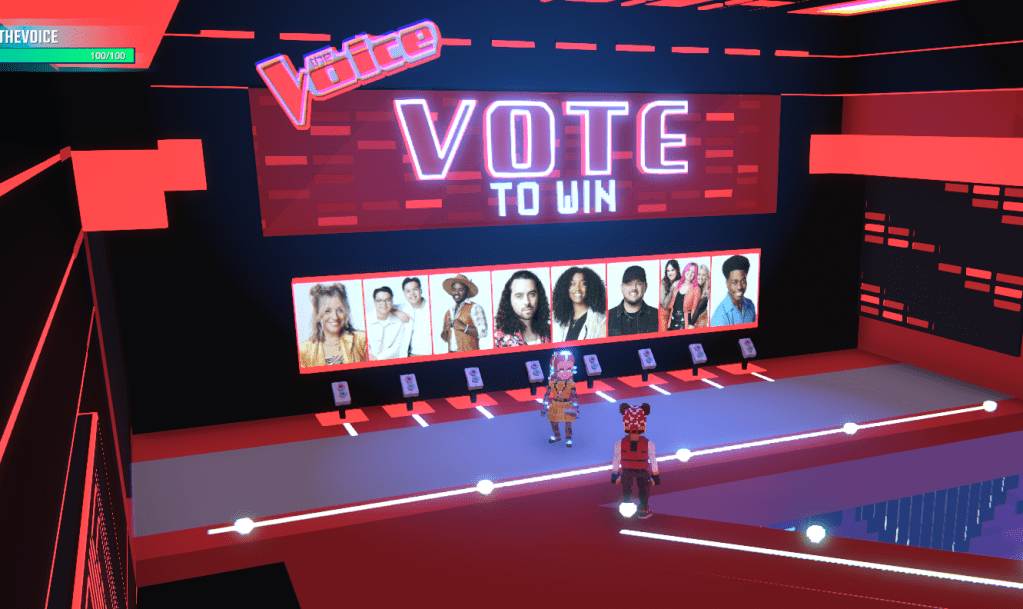Secure your place at the Digiday Media Buying Summit in Nashville, March 2-4

The international reality television franchise The Voice has launched its own virtual experience today inside the metaverse platform The Sandbox. It’s the latest example of the brand’s push into virtual space, showcasing The Voice’s uniquely cross-platform approach to its metaverse strategy.
In addition to this week’s launch in The Sandbox — a mini game named “Coach Battle,” in which players act as coaches in a fictional version of the show — The Voice has shown up across a wide range of metaverse platforms in the past year, including Decentraland, Roblox and HiberWorld. The brand’s virtual activations have ranged from dedicated, always-on metaverse experiences to sales of digital merchandise such as branded virtual hoodies and puffer jackets.
“Overall, our aim was to basically create deeper fan engagement with our audiences,” said Leila Ahmed, a brand manager for The Voice owner ITV Studios. “We know that there’s a lot of people spending more time on these types of platforms, and for us, what was really imperative and important was to engage the connection with the fans and establish a way of how we can actually connect the TV show to these types of platforms.”

The Voice’s presence in the metaverse is not directly connected to NBC’s hit “The Voice” television show, which is the American version of the international TV franchise. ITV Studios’ expansion into metaverse platforms represents one way the company is looking to take advantage of its ownership of the broader The Voice brand without having to deal with regional partners such as NBC.
“If you wanted to make a TV show, you’d have to get permission from the network, right? This is now reverse engineering things, because ITV doesn’t need to get permission from NBC — they can go build it themselves on Roblox,” said Justin Hochberg, the CEO of Virtual Brand Group, which partnered with The Voice to design and build the brand’s virtual presence. “So they have moved from being the supplier to the actual distributor.”

Indeed, as ITV Studios builds out its presence in the metaverse, it is looking to transform its virtual spaces from a marketing play into inventory that can be actively sold to sponsors and brand partners from across The Voice’s international portfolio. So far, none of The Voice’s sponsors have officially shown up inside any of its virtual experiences, but Ahmed said that conversations are underway, without naming names.
The Voice also views virtual merchandise as a promising revenue stream. Over the past year, the brand has partnered with Ready Player Me to design and sell virtual merchandise inside platforms such as HiberWorld, which sells a virtual The Voice hoodie for $1.99.
“They’ve been very receptive of that endeavor — for games, it’s basically a barrier breaker,” said Ready Player Me head of strategic partnerships Stan Georgiev. “Many developers find it very difficult to even get in touch with high-quality brands and IPs; it’s a notorious struggle in the industry.”
As virtual e-commerce becomes more widespread, The Voice could see downstream benefits from its position as an early mover in the space. After all, Roblox launched a pilot test of real-life commerce in partnership with Walmart last week, indicating that the platform has both the interest and technological know-how to implement virtual merch for brands such as The Voice.
“We’re always looking to expand in that medium. I mean, we are a commercial team as well here, and we know that these platforms actually do have great revenue potential,” Ahmed said. “And we’re basically now at the forefront of trialing this across multiple platforms.”
More in Marketing

Future of Marketing Briefing: AI’s branding problem is why marketers keep it off the label
The reputational downside is clearer than the branding upside, which makes discretion the safer strategy.

While holdcos build ‘death stars of content,’ indie creative agencies take alternative routes
Indie agencies and the holding company sector were once bound together. The Super Bowl and WPP’s latest remodeling plans show they’re heading in different directions.

How Boll & Branch leverages AI for operational and creative tasks
Boll & Branch first and foremost uses AI to manage workflows across teams.








